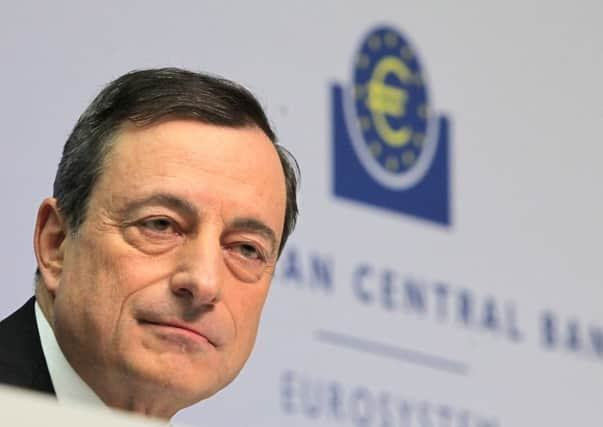Comment: Draghi’s super-bazooka | Balfour’s woes


Draghi’s announcement yesterday of a €60 billion-a-month (£45bn) ECB bond-buying programme to help stave off eurozone deflation and apply spark plugs to the single market’s largely stagnant economy is not quite in that category.
But it is a step in the right direction.
Some UK business organisations, such as the British Chambers of Commerce, have said it is too little, too late. And, indeed, the ECB has been disappointingly dilatory in its response to the eurozone’s problems compared to the quantitative easing programmes that were ushered in by the United Kingdom and United States.
Advertisement
Hide AdAdvertisement
Hide AdWe will never know exactly what part QE played, but both the US and UK recoveries are much farther down the road, while the struggling eurozone and Japan are the two major developed economies casting the biggest shadow over global growth.
But a start has to be made somewhere, and Draghi did that yesterday, even with deep reservations in the biggest and most fiscally conservative European Union and eurozonemember, Germany.
The ECB may have procrastinated on the pump-priming, but better late than never, particularly with a burgeoning spectre of deflation in the European single market.
The fear that deflation might take hold and put consumers off purchasing because they think prices have farther to fall, and worsen the economic situation across the Channel, seems to have been the key factor in the ECB pulling its finger out.
Some business sceptics may sniff at the scale and possible impact of European QE, but it is still equivalent to about 7 per cent of eurozone GDP. And if not QE across the Channel to try to rescue the situation, what else, and when?
Balfour doesn’t miss a beat with the bad news
THE latest shocks at Balfour Beatty will probably make many investors in the construction and engineering infrastructure group wish they had taken the Carillion takeover shilling last year. And they might make Carillion think it had a lucky escape.
Balfour, the exact opposite in corporate terms of the gift that keeps on giving, has announced a fourth profits warning in 12 months. It has also cancelled a £200 million share buyback.
The latest £70m alert follows a review of the group’s construction business by accountancy firm KPMG, which found both shortfalls in the value of contracts as of last summer and disputed Balfour in-house contract forecasts up to the end of last year. The group’s total profit warnings in the past year have amounted to £210m. That memorable day a year ago when Balfour was celebrating its £154m high-end contract to convert London’s Olympic stadium must seem a different lifetime.
Advertisement
Hide AdAdvertisement
Hide AdNew boss Leo Quinn started this month, with former chief e Andrew McNaughton having hit the exit last May. Quinn has identified one of the main problems as being one of labyrinthine sprawl where clear oversight and financial control of a devolved business model has been lost.
Sorting out the firm will not be a case of repainting the Forth Bridge, but it will be much more onerous, metaphorically speaking, than repairing a stretch of motorway.